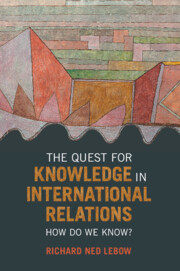Book contents
- The Quest for Knowledge in International Relations
- The Quest for Knowledge in International Relations
- Copyright page
- Dedication
- Contents
- Preface
- 1 Introduction
- Part I What Is Knowledge?
- 2 What Is Knowledge?
- 3 Positivism and Interpretivism
- Part II How Do We Acquire Knowledge?
- Part III How Do We Claim Knowledge?
- Part IV Reason and Cause
- Part V Conclusions
- Index
2 - What Is Knowledge?
from Part I - What Is Knowledge?
Published online by Cambridge University Press: 07 April 2022
- The Quest for Knowledge in International Relations
- The Quest for Knowledge in International Relations
- Copyright page
- Dedication
- Contents
- Preface
- 1 Introduction
- Part I What Is Knowledge?
- 2 What Is Knowledge?
- 3 Positivism and Interpretivism
- Part II How Do We Acquire Knowledge?
- Part III How Do We Claim Knowledge?
- Part IV Reason and Cause
- Part V Conclusions
- Index
Summary
I describes four kinds of knowledge and associate each with distinctive projects. What we generally refer to as positivist IR aspires to what Aristotle calls episteme: scientific knowledge that can be expressed mathematically. Interpretivist approaches aspire to phroēesis, which is best understood as practical knowledge that helps us cope with the world. This distinction cuts across paradigms and is a far more fundamental division.
- Type
- Chapter
- Information
- The Quest for Knowledge in International RelationsHow Do We Know?, pp. 31 - 46Publisher: Cambridge University PressPrint publication year: 2022

